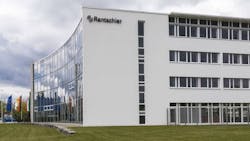Rentschler Biopharma invests in German, US sites as company makes strategic shift
Germany-based Rentschler Biopharma, a family-owned company with a 150-year history, has seen the ups and downs of the contract development and manufacturing organization industry. With the start of 2025, the CDMO announced in late January a strategic realignment of its global operations, including the decision to withdraw from the cell and gene therapy field due to slower-than-expected growth.
Under the strategic shift, Rentschler is ceasing operations at its Stevenage, UK site — which was established in 2021 as a Center of Excellence for cell and gene therapy — and is increasing the company’s focus on biologics.
Rentschler CEO Benedikt von Braunmühl — who took the helm in 2023 — is cautiously optimistic about the biologics business environment so far this year, as market conditions continue to evolve.
2025 is shaping up to be “slightly more positive than last year,” von Braunmühl told Pharma Manufacturing during last month’s J.P. Morgan Healthcare Conference in San Francisco. While he’s “not overly enthusiastic” about the business environment, his assessment is that some of the later-stage biotech companies have gotten “good” funding as investors are “de-risking” their investments, while early-stage companies are still operating in a “difficult” environment.
However, overall, von Braunmühl contends that Rentschler’s biopharmaceutical services, which include process development, cGMP manufacturing and client program management, are well-positioned to meet the complex needs of biopharma customers.
“Our clear strategy is to be a drug substance provider,” von Braunmühl said.
Rentschler’s business is evenly divided between early development, all clinical trial stages and commercial stage contracts, according to von Braunmühl, with customers in Asia, Europe, and North America.
When it comes to antibody-drug conjugates (ADCs), which use monoclonal antibodies (mAbs) to bind target antigens and deliver cytotoxic agents, von Braunmühl said that Rentschler is looking to target the hot ADC space, while still evaluating the entire value chain and related services that the company will offer going forward.
“Where we can add value is the antibodies piece right now,” von Braunmühl said.
Investments in Germany, US
Rentschler, which has a workforce of about 1,400 employees, recently made major investments in its core capabilities. In October 2024, the company announced the largest-ever investment at its headquarters in Laupheim, Germany to enhance production efficiency. The project, which will take three years to complete, includes a new four-story, buffer media station slated to be operational by 2028.
The facility, which will include six buffer tanks and three media tanks with buffer and media preparation carried out in separate areas, will be connected to an in-house logistics system and a piping system for upstream and downstream processes. The Laupheim investment is part of the CDMO’s ongoing efforts to “automate and digitalize the business,” von Braunmühl said.
Last year, Rentschler’s new U.S. production line in Milford, Massachusetts — featuring four 2,000L single-use bioreactors — became fully operational to meet the growing demand for biologics. The expansion, which was the largest investment in the company’s history, effectively doubled its global cGMP capacity which will mainly serve commercial manufacturing of highly complex molecules.
The new Milford production line added 22,000 square feet of manufacturing cleanroom space and four 2,000L single-use bioreactors, bringing the total production lines at the site to three.
The investment in Milford was “a bit north of triple-digit” millions of dollars, according to von Braunmühl, and Rentschler’s Laupheim expansion is costing the company in the “higher end of the double-digit” millions of dollars.
Rentschler claims to have pioneered single-use manufacturing and to be among the first adopters of disposable bioreactors in the industry. The company offers both stainless steel and disposable equipment. The CDMO has stainless steel bioreactors up to 3,000L as well as single-use bioreactors up to 2,000L.
The company sees the value of offering both stainless steel and disposable manufacturing, according to von Braunmühl. At Rentschler’s production facility in Milford, it has only single-use bioreactors, while stainless steel and single-use are leveraged at the company’s headquarters in Laupheim. “Both have advantages and disadvantages,” von Braunmühl said.
BIOSECURE Act benefit
On the policy side, von Braunmühl sees Rentschler continuing to benefit from the BIOSECURE Act, which seeks to prevents U.S. federal funds from supporting certain Chinese contract manufacturers. While the proposed legislation has still not become law, it has become a catalyst for biopharma customers to look for alternative options to Chinese CDMOs in geographies outside of China.
“We did benefit,” von Braunmühl said. “After the first announcements beginning last year [about the BIOSECURE Act], there was a big panic. We got a lot of requests from customers with commercial projects who were ready to start the discussions with Chinese CDMOs for contracts.”
At the same time, von Braunmühl noted that the initial “panic” has “faded” due to a grandfather clause included in the bill, which would allow existing contracts with the five Chinese CDMOs named in the BIOSECURE Act to be maintained until 2032.
As a result, biopharma companies “are making more rational decisions going forward, for which we may benefit,” according to von Braunmühl.
About the Author
Greg Slabodkin
Editor in Chief
As Editor in Chief, Greg oversees all aspects of planning, managing and producing the content for Pharma Manufacturing’s print magazines, website, digital products, and in-person events, as well as the daily operations of its editorial team.
For more than 20 years, Greg has covered the healthcare, life sciences, and medical device industries for several trade publications. He is the recipient of a Post-Newsweek Business Information Editorial Excellence Award for his news reporting and a Gold Award for Best Case Study from the American Society of Healthcare Publication Editors. In addition, Greg is a Healthcare Fellow from the Society for Advancing Business Editing and Writing.
When not covering the pharma manufacturing industry, he is an avid Buffalo Bills football fan, likes to kayak and plays guitar.
